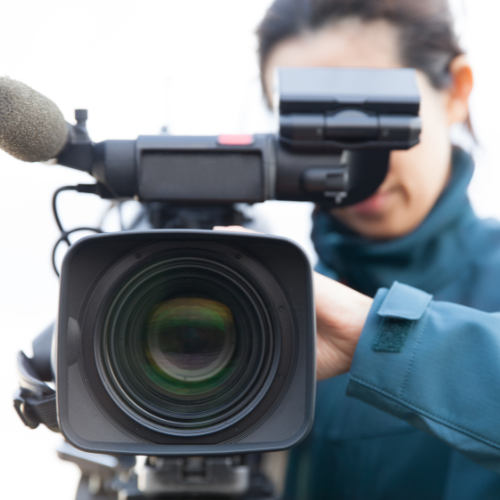Small Business
Photography
In your line of work, you likely face specific risks, including property damage, data loss, employee errors, and accidents.
Small Business
Professional Photographer / Videographer
Professional photographers need business insurance to protect themselves against financial losses that could be caused by a variety of things, such as property damage, equipment breakdown, lawsuits, or third-party claims. Professional photographers often use expensive equipment such as cameras, lenses, and other accessories, which can be costly to replace in the event of an accident or theft.
Business insurance can help protect the photographer against these types of risks, as well as provide coverage for the costs of defending a lawsuit and any awards that could be issued against the photographer.
What Type of Insurance should Professional Photographers have?
- Professional Liability (Errors & Omissions)
- General Liability (GL)
- Business Owner Policy (BOP) combines GL, business property, and loss of income
- Cyber Insurance
- Worker’s Compensation
Why do Professional Photographers need Professional Liability Insurance?
Professional photographers need Professional Liability Insurance to protect themselves from claims of negligence or copyright infringement. This type of insurance provides financial protection in the event that a client sues the photographer for damages caused by the photographer’s mistake or negligence. It also provides coverage for claims of copyright infringement, which can be expensive and time–consuming to defend against.
What Can a Business Owner’s Policy Do For Professional Photographers?
A BOP combines three basic coverage types into one policy, making it easy to choose the coverage level that your business needs and stay protected without a lot of research into specific policy types. The most common coverage types included in most BOP policies are:
- Liability coverage. Protect yourself from liability in your own building or when you’re showing properties to others with this type of coverage, which comes standard in most BOP policies. This coverage protects you from lawsuits arising from injuries caused to clients and employees during the course of operations. For example, if a client in your office for a meeting falls in your place of business and breaks a leg, this policy protects you from any liability claims arising from the event.
- Business property damage coverage. If your business or any of your furnishings and equipment are damaged due to a covered peril – such as a tornado or fire – then this policy helps you replace the lost items.
- Loss of business income. When your business is forced to shutter its doors due to a covered event, this policy type pays for the lost revenue your business would have received if it were operational. For example, if the wind tears your roof off, forcing you to close for repairs, then the amount of income you lose as a result is payable under this type of insurance.
A Business Owner’s Policy (BOP) is a type of insurance policy designed to provide business owners with broad coverage for their business.
For professional photographers, a BOP can provide the following protection:
- Coverage for studio property damage, such as equipment, furniture, and supplies.
- Liability protection against claims of negligence or copyright infringement.
- Business interruption coverage to protect against lost income due to fire, vandalism, or natural disasters.
- Crime coverage to protect against theft, embezzlement, or fraud.
- Advertising injury coverage to protect against claims of libel, slander, or copyright infringement.
- Personal and advertising injury coverage to protect against claims of libel, slander, or invasion of privacy.
Why would a small business need cyber insurance?
Cyber insurance can help protect professional photographers by providing coverage for the cost of recovering lost data, the cost of reputational damage due to a breach, and the cost of legal fees related to a data breach.
It can also provide coverage for the cost of notifying customers of a data breach, the cost of providing credit monitoring services for affected customers, and the cost of any fines or penalties imposed by regulatory authorities.
Additionally, cyber insurance can provide coverage for the cost of replacing stolen equipment and the cost of restoring or replacing corrupted data.
What Does General Liability Cover?
General Liability can protect you from advertising liability, customer bodily injury and property damage caused to a customer’s belongings. It covers most potential business losses such as fire, vandalism or even water damage as long as they are not specifically excluded from your commercial insurance policy contract.
The most important question to consider is what does a general liability policy cover. The answer is relatively simple. It covers most situations where you, as a broker, might be liable to a consumer for damages. This covers a few different situations.
- Bodily Injury If a client slips and falls or injures themselves while visiting your office, you could be liable for their medical expenses. This can involve a significant cost to you if you do not carry liability insurance.
- Property Damage Being a real estate broker means you are taking strangers into someone’s home. If your buyer accidentally or purposefully breaks or steals something in that home, you could be responsible for the damages. This is another situation that can result in financial loss.
- What About Lawsuits? Depending on the lawsuit, general liability or professional liability covers your and possibly your client’s costs. These lawsuits can result in thousands of dollars worth of damages, not to mention the damage to your reputation.
General liability protects you in your office and when you are visiting clients at their property. It can aid you by paying the costs associated with injury, theft, or property damage, which is why it is a vital part of any professional photographers insurance policy.
Professional photographers need business insurance to help protect their business and income, as well as to provide peace of mind knowing they are covered in the event of an unforeseen loss.


